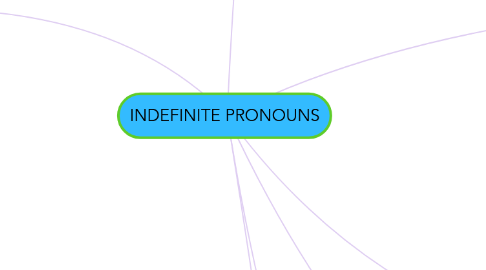
1. In affirmative sentences, indefinite pronouns using some are used to describe an indefinite quantity, the indefinite pronouns with every are used to describe a complete quantity, and the pronouns with no are used to describe an absence. Indefinite pronouns with no are often used in affirmative sentences with a negative meaning, but these are nevertheless not negative sentences because they are lacking the word not.
1.1. Examples
1.1.1. Everyone is using my cellphone.
1.1.2. Someone is eating my food.
1.1.3. No one is jumping in my bed.
1.1.4. I gave everything to Josue.
1.1.5. He saw something in the kitchen.
1.1.6. There is nothing to drink.
1.1.7. I looked everywhere for my shoes.
1.1.8. Adalberto is looking for somewhere to live.
1.1.9. There is nowhere as beautiful as Madrid.
1.2. Any and the indefinite pronouns formed with it can also be used in affirmative sentences with a meaning that is close to every: whichever person, whichever place, whichever thing, etc.
1.2.1. Examples
1.2.1.1. They can choose anything from the store.
1.2.1.2. You may invite anybody you want to your prom party.
1.2.1.3. We can go anywhere you'd like this fall.
1.2.1.4. He would give anything to get into Oxford.
1.2.1.5. Terry would follow you anywhere.
2. Negative questions, Indefinite pronouns with every, some, and any can be used to form negative questions. These questions can usually be answered with a "yes" or a "no" Pronouns formed with anyand every are used to form true questions, while those with some generally imply a question to which we already know or suspect the answer.
2.1. Examples
2.1.1. Is there anything to eat?
2.1.2. Did you go anywhere last night?
2.1.3. Is everyone here?
2.1.4. Have you looked everywhere?
3. Noun
3.1. I would like to go *to London* this summer.
4. I would like to go *somewhere* this summer.
5. Indefinite pronouns do not refer to a specific person, place, or thing. In English, there is a particular group of indefinite pronouns formed with a quantifier or distributive preceeded by any, some, every and no.
5.1. All
5.1.1. Person
5.1.1.1. Everyone - Everybody
5.1.2. Place
5.1.2.1. Everywhere
5.1.3. Thing
5.1.3.1. Everything
5.2. Part (positive)
5.2.1. Person
5.2.1.1. Someone - Somebody
5.2.2. Place
5.2.2.1. Somewhere
5.2.3. Thing
5.2.3.1. Something
5.3. Part (Negative)
5.3.1. Person
5.3.1.1. Anyone- Anybody
5.3.2. Place
5.3.2.1. Anywhere
5.3.3. Thing
5.3.3.1. Anything
5.4. Person
5.4.1. No one - Nobody
5.5. None
5.5.1. Place
5.5.1.1. Nowhere
5.5.2. Thing
5.5.2.1. Nothing
6. Indefinite pronouns with some and any are used to describe indefinite and incomplete quantities in the same way that some and any are used alone. Indefinite pronouns are placed in the same location as a noun would go in the sentence.
6.1. Example
6.1.1. Indefinite Pronoun
7. Negative sentences can only be formed with the indefinite pronouns that include any.
7.1. Examples
7.1.1. I don't have anything to drink.
7.1.2. She didn't go anywhere last vacations.
7.1.3. I can't find anyone to come with me.
